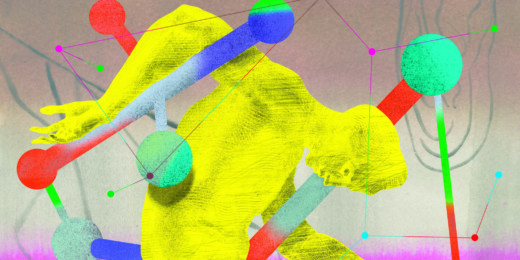Stanford Medicine researchers studied how AI can enhance evaluation of cardiac tests in the clinic and found it improved accuracy.
Category: Innovation & Technology
For better video meetings, try taking turns talking
Stanford Medicine scientists have identified how virtual interactions stilt our conversations and what that looks like in the brain.
Padded helmet cover shows little protection for football players
A foam cap that fits over football helmets seemed to reduce the force of blows in lab experiments — but not on the field.
Catalyst’s newest cohort spotlights Stanford innovation
Stanford Medicine's Catalyst program, which aims to accelerate impactful health care innovations, launches a new cohort.
Potential and pitfalls of smart toilets: Would you use one?
Researchers at Stanford Medicine are exploring the ethical and legal considerations of the smart toilet, which detects disease through waste.
Looking for love in all the wrong hormones
Researchers have found that oxytocin, commonly known as the "love hormone" may not be crucial for the social behaviors it's known for.
Conference for pre-med students addresses health disparities
SUMMA, a conference designed to train the next generation of physicians and increase diversity in the medical field is accepting registrants.
People with disabilities take to the sky
A Stanford occupational therapist and a computer science student harness their experiences to help bring people with disabilities to space.
A big jump in prosthetic vision
By devising special pixels, Stanford University researchers have enhanced prosthetic vision with a new implant that improves vision.
Wireless implant could help remove deadly brain tumors
Brain tumors are among the most deadly and difficult-to-treat cancers. Glioblastoma, a particularly aggressive form, kills more than 10,000 Americans a year and has a …
Finding patterns of success across 50 years of innovation
Researchers conducted a study to look back at 50 years of innovation, tracking how trends in technology have changed.
Training physicians and algorithms in dermatology diversity
Researchers are addressing bias in algorithms that detect dermatology diseases by adding more diverse skin tone images to data sets.
Delivering free (tele)health care to Ukrainians
Students and physicians at Stanford created a program called Telehelp Ukraine to serve health care needs of those in Ukraine.
Pap smears, be gone? Using menstrual blood to detect HPV
Researchers have created a menstrual pad that can passively help detect HPV, potentially offering a screening method other than pap smears.
Stanford Medicine magazine explores the molecules within us
Stanford Medicine magazine explores the molecules behind human biology and how understanding them fuels medical discoveries and innovations.
Building a ‘BUDI’ to help kids with cerebral palsy
Stanford med student designs biofeedback app meant to encourage children with cerebral palsy move their arms to build strength.

















